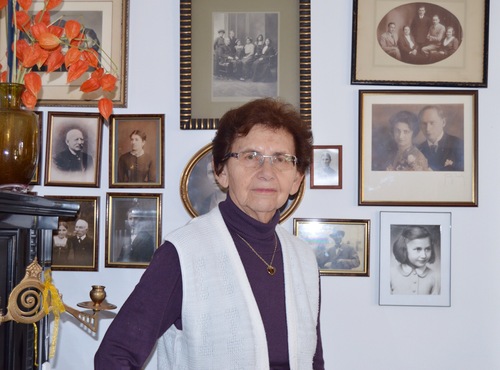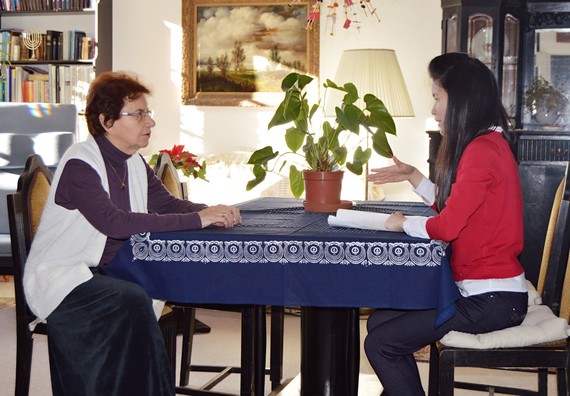
Dagmar Lieblova is Holocaust survivor and the chairperson and cofounder of the Terezin Initiative. Lieblova was 14 years old when she and her family were transported to Auschwitz. All of her family members were killed in the concentration camp's gas chambers, but she was able to leave Auschwitz due to a clerical error regarding her date of birth that saved her from certain death during the Holocaust. Lan Anh Vu sat down with Lieblova to hear more about her survival story: a testament to the resilience and strength of the human spirit.
As told to Lan Anh Vu
My Childhood Prior to the War
My childhood was very happy. We were a family of four, with my parents and my younger sister. We lived in Kutna Hora, a small town in Bohemia. My father was a doctor, and my mother was a housewife. At that time, I didn't think that it was anything special, because it was quite normal for me.
During the War
My family and I were deported to Terezin ghetto in June 1942. In Terezin, my father continued to work as a doctor and my mother as a cleaning lady. The living conditions were not that bad, in comparison with the way that things turned out. We had meals three times per day; in the morning, there was a sort of warm liquid that they called coffee, soup for lunch and also a second course, normally potatoes and a sauce, or a dumpling with a sauce. And with the ration of bread we received a small piece of margarine or sausage or a spoonful of sugar or preserve. It was not enough, but we at least had something to eat.
In December 1943, we were deported to Auschwitz by train. At first, we didn't know where we were going, but on the way, we realized that it was to the east. We arrived at Auschwitz at night. Transports from September and December 1943 and May 1944 went to the family camp in Auschwitz without any sort of selection. On the first night, they began tattooing numbers onto our arms. Then we left for the baths. After our bath, we were given clothes, which were nothing but thin rags, hardly enough for us to keep warm in the freezing December cold.
I lived with my mother and sister in the same block. My father had to go around checking the inmates to see whether they had not lice in their hair or their bodies. In a way, this arrangement was good for us; he could visit the women's blocks, so we could see him. Afterward, I went to the children's block, where I later looked after 10-year-old boys. In the morning and evening each day, everyone in the camp had to come out and stand in front of the blocks for hours for roll call until the SS guards came and counted us. It was in December, and it was really cold.
The food was very simple. During the day, there was a portion of soup and, in the evening, a piece of bread. There was not enough food to eat, so we were starving. The 4000 men, women and children who were sent from Terezin to Auschwitz in September 1943 were killed in the gas chamber during the night from 8 to 9 March 1944. We were terrified.
In July 1944, the selection came. The designation of people who could work meant women aged from 16 to 40 and men from 16 to 50. I was 15, my sister was 12, my father was 52, and my mother was 43. None of us fell into that category. However, my date of birth was incorrectly marked as 1925 instead of 1929, which made me old enough to be added to the list of people to be transferred to a work camp. I don't know who made the mistake, but it was a mistake that saved my life. It was incredibly lucky for me.
I was deported with other women from Auschwitz to Hamburg. Hamburg was completely destroyed. We had to work exceptionally hard. We went to the port and boarded boats set for the bombarded factories, where we cleared away the wreckage and dug out the rails. We were given accommodations with a bed and a portion of soup for the whole day. We were very hungry and felt exhausted from the hard labor.
In March 1945, we were sent away from Hamburg. Several people managed to escape on the way. We ultimately arrived at Bergen-Belsen concentration camp. It is hard to describe what it was like at that time. In the barracks that we went to, there was a bare floor where we had to sit since we were so crammed. The hygienic conditions were terrible, for there was no water at all, and there wasn't any food left. A host of dead bodies were lain everywhere between the blocks; nobody cleaned them up. There were also a lot of lice. Then, on April 15, we were liberated by the British army. I didn't even have the strength to stand up to see what was happening. If they had come several days later, then we wouldn't have survived, because the conditions were so horrific. I later caught a high fever and had to stay in the hospital until July 1945.
Post - War
I had developed a lung disease. The doctor arranged for me to stay in a sanatorium in Zamberk, where, as I later learned, the only reason that they accepted me was to give a doctor's daughter a decent place to die. They didn't think that I would survive. But then the surgery succeeded, and I survived. A miracle had occurred. I stayed in the sanatorium for two and a half years, until February 1948.
I returned to my hometown and was given an apartment in our old house. I then decided that I should study, because I hadn't even finished my elementary-school education. Education was forbidden for Jewish children during the war. I managed to complete my high-school education and studied German - Czech at Charles University in the Faculty of Arts. I then taught German at Charles University. I taught also German at Ghana Institute of Languages in the sixties and Czech at University in Uppsala, Sweden in the beginning of eighties. In 1989, other Holocaust survivors and I established the Terezin Initiative, in which I serve as chairperson. The organization's goal is to remind the world of the horrors of the Holocaust.
Lesson Learned
I have learned the value of life, that life is a very important thing. To be alive is a miracle. We should live life so that we can help and be kind to each other. I would live a life that my parents wouldn't be ashamed of. We had a normal life until the Nazis came. We were lucky to leave Auschwitz, and though it didn't seem that we would survive, we tried to survive anyway. We had the will and hope to survive. The experiences have never left me and are imprinted in my memory. I live a busy life, I spent 60 happy years with my late husband, I have three wonderful children and six nice grandchildren and I don't know any other way to relieve that pain.
Through my experience, I would tell young generation to be tolerant and fight against the evil. Don't let anybody to be persecuted because of the color of the skin, because of the nation or religion. If we are black, white, yellow, if we are Christians, Muslims or Jews we all are human beings and there is enough space for all of us to live in our beautiful world. Only we must not destroy it!
This interview has been condensed and edited for clarity.
This post is part of "How I Got There" series, which features people around the world speaking about their journeys. What is the path to success? What challenges did people face and how did they overcome them? Lan Anh and her guests answer all these questions and much more. To view the entire series, visit here.


